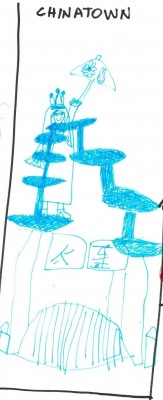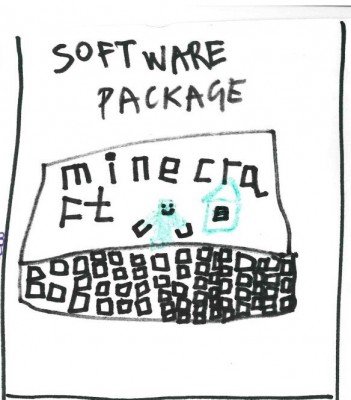Episode 2: Portrait of the Liverpool Biennial as a little girl
[Soon after the jubilant opening.]
Liverpool Biennial lies in the arms of an early summer morning. It was supposed to be a changing and uncertain show – just like a shy little girl. Let’s call this shy little girl Pauline. Pauline is always engaged in silent dialogues with Isabella, an imaginary friend who does not exist for anyone else. Sometimes they go on adventures together, encountering things they don’t yet understand. One day, when they visited the Biennial exhibition, which is about time-travel, they overheard some artists talking about what they liked or didn’t like there. Pauline turned to discuss their comments with her secret friend – and between them, they wondered if they really meant what they said. Sometimes Pauline and Isabella would wander around the exhibition looking at the most talked about artworks, or venture onto the streets of Liverpool: the city that inspired the show. Once, as they were following an artist on her way to the Adelphi Hotel, they passed by a Cantonese restaurant called San San. It had been out of business for quite a while. A neon sign hung above the door: strange and switched off, its outline left a deep impression on Pauline. Its irregular, repetitive rhythm reminded her of the “hills with people walking in front of rainbows” which she used to draw with felt tip pens back at school. On a dust-covered window, a notice on a piece of paper read:
Sorry!
We are closing our doors by end of May, 2014.
Thank you for your visits over the past 34 years.
–Staff of San San Restaurant
The notice had been up for ages, and whenever she walked up look at it more closely, the date mentioned in the announcement sounded like a song’s continuous end note —a leftover sound. Pauline though that such an unchanging, single note sounded just like someone whispering from under a blanket, smothering the vibrant hustle and bustle that must once have filled the restaurant.
Pauline didn’t really understand how long 34 years was, so she asked Isabella, but even for such imaginary (or, better said, ideal) being, this period of time was too long to ponder. However, Isabella and Pauline had known each other for a long time, and Isabella was perfectly comfortable in her role as knowledgeable companion. Methodically, Pauline’s imaginary friend read about all the artists that had contributed to Liverpool Biennial, and about every artwork in the show. She read about different sorts of time, and how all these times were used to create the whole exhibition. Isabella came up with an answer good enough to convince her little friend: “Compared to San San’s closing forever, 34 years is actually not that long.”
Some of the texts said that San San was forgotten by time. What does it mean to be ‘forgotten by time’? Pauline and her friend wondered. “Maybe it means to be forgotten for a long time?”
Pauline thought of a felt tip pen she had once left at her grandma’s house. She was time, and the pen was San San. She tried looking at the world from the perspective of that abandoned pen, to imagine the feeling of being forgotten by time.
“Perhaps the pen is no longer being used by anyone, and it has been lying in the corner all along,” she thought. Pauline and Isabella were thinking together, and to understand San San’s problem better, they began to read the exhibition’s guidebook. They decided to start from the clues they could understand. They opened the first page. It started with a sentence, followed by some discussions entitled ‘what is time?’ Some words jumped out to them – “forgetting”, “nostalgic”, “time lapse”, “flashback”. These descriptions were not very helpful. But the discussion’s main point was that every change takes time. And since time gives birth to everything, then all things are vulnerable to time. When we speak of traveling through time, we are really talking about changing the relationship between time and things. Instead of things being changed by time we need to get time to be changed by things.
Travelling through time… OK, but to when? Pauline had never witnessed a San San full of visitors, which might well be a reason to travel to that time when its rooms were filled with boiling steam and the scent of delicious dim sum. Pauline had not the slightest bit of nostalgia or sentimentality, the sort of grownup emotion that can easily trigger flashbacks, nor could Isabella imagine where the edges of time travel could be. ‘Would the start be at the start of the world?’ Pauline asked.
Pauline wondered whether, when something is no longer needed by time, it has already experienced time travel. “When San San closed, it left time outside the window: and that’s how San San turned into a place forgotten by time. It pushed time away.”
“But if, like San San, there’s nothing you plan to do anymore, time becomes like an object.” Isabella continued: “Of course, it may as well have been San San itself that forgot time. Because it forgot time, the board that announces its closure still hangs there on the window, just like when you’re sick and you fall asleep in bed, and your mum calls your teacher to tell her you are not going to school. This sort of notice is like an absence request form, sent to time.”
“Oh!” thought Pauline, “so this is what grownups mean by time travel. It’s probably about forgetting, about abandoning time. We have to give up the idea that if something is used by people then it can be measured in time.”
They left San San, and continued their journey towards the Adelphi. At the corner, Pauline had the feeling she had just gathered another secret with Isabella. She suddenly remembered something said by those artists and their friends in the exhibition (remember: after all, Pauline is just the embodiment of an exhibition): “Children are in fact a science fiction genre…”
…to this day, she still doesn’t quite understand this sentence, but she is convinced with her whole heart that as long as there is Isabella, she will eventually solve the puzzle.
Translated from Chinese by Alvin Li and interpreted by Pauline Manacorda

























